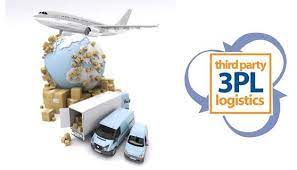It’s not always the most efficient use of resources for a company to perform all of its functions in-house. Small online stores are especially susceptible to this problem. Many online retailers have flourished despite having a small budget. By using a 3PL logistics provider, one of the most important parts of running an online store can be done by experts. This frees up resources that can be used for advertising, growth, and happy customers. 3PL logistics companies can store your inventory. Your things will be picked, packed, and shipped by it. Your consumers and production operations depend on 3PL. Clients are happy, and your business grows when order fulfillment runs smoothly. Excellent fulfillment is the key to eCommerce success. Before hiring a 3PL logistics company, you need to know what it is. In this piece, 3PL logistics examples, pros, and cons will be discussed.
What is 3PL Logistics?
To put it simply, a 3PL (Third-Party Logistics) is a partner or service that online retailers can use to better manage their supply chain. Services commonly provided by 3PL logistics providers (also known as “3PLs”) include stock management, order processing, transport coordination, retail distribution, and product exchanges and returns.
When a retailer works with a 3PL logistics provider, they are freed up to concentrate on other elements of their company.
You can have your inventory stored in a 3PL vendor’s warehouse and have it transported directly from your manufacturers instead of managing your own warehouses and handling distribution in-house. Items are promptly dispatched from the 3PL’s storage facility following receipt of an online transaction. Customers rarely give any thought to the handoff between order receipt and fulfillment when working with a 3PL because the procedure is so straightforward and unobtrusive. With this, online stores can focus on what they do best: creating and selling things.
Furthermore, 3PL logistics companies have been and will continue to be an integral part of many thriving e-commerce firms’ ability to weather the recent supply chain crises. The acts of political instability, natural disasters, human resource shortages, and regulatory hurdles that we have witnessed in the previous two years are unfortunately not an outlier. Experts estimate that major disruptions to the supply chain occur about every 3.7 years, and they are becoming more frequent and severe.
How Does a 3PL Work?
If you’re using 3PL logistics to fulfill orders, here’s what usually happens (though this can vary depending on your provider and the services you’ve agreed upon):
- The 3PL logistics system receives tracking data and synchronizes it with your order management program.
- The 3PL will store all of your goods in its warehouse after receiving them from you.
- Your e-commerce site either manually or automatically pushes orders to the 3PL logistics provider when they are placed (if its software integrates with your online store).
- 3PL logistics companies (TPLS) typically print out shipping labels or work with one of their many shipping carrier partners.
- A member of the warehouse staff is given a “picking list” to use in retrieving the goods directly.
Essentials of Third-Party Logistics (3PL)
3PL logistics companies handle both incoming and outgoing transit and storage for their customers. The majority of 3PLs either own or lease warehouse facilities that they then make available to their customers. Companies often do not operate their own fleet of trucks, instead relying on 3PL logistics providers.
You are outsourcing your order fulfillment, hence the term “third-party.” You have no right to utilize the storage facility. As an alternative, you may choose to keep your goods in a large warehouse that houses the goods of many other businesses and rent out shelf space there. After your products are received at the warehouse, they will be stocked by the warehouse staff. Workers retrieve products from storage to fulfill customer requests and pack them safely for transport. In order to get orders to your customers, the 3PL partners with numerous shipping companies.
Warehouses used in 3PL logistics providers are built to perform quickly and efficiently. They will be able to take on more work as your company expands, letting you do more without adding workers. Working with a 3PL can help you save money and time on shipment. When outsourcing to a 3PL for your eCommerce fulfillment needs, you may take advantage of their expertise and dedication.
What Are the Four Types of 3PL?
Many things are always evolving, and 3PL logistics are only one example. You, as a business owner, are likely to rely heavily on 3PL logistics providers in Malaysia, so it’s important that you’re familiar with the options available to you.
You can better serve your company’s demands by choosing the right type if you are familiar with the variations between them. Because of this, if you select the best 3PL for your company’s needs, you won’t squander your time or money. Also, consumer confidence in and loyalty to your company would be high. Here are the four types of 3PL:
#1. 3PL Customer Developer
There aren’t very many 3PLs, but their customers tend to be some of the biggest startups around. There aren’t a lot of them because they provide the most thorough supervision.
In many cases, they become an integral part of the client’s existing logistical structure. This will give them complete command of the situation. Don’t worry, they offer frequent data and matrix reports to their clientele. This allowed them to maintain control over their inventory and shipping processes.
You should be prepared to hand over all control of your logistics to this type of 3PL if you decide to work with them.
#2. Standard Third-Party Logistics Service Provider
The term “standard” refers to the fact that this 3PL is the most widespread in the industry. It’s handy for selecting and packing items.
A regular 3PL company will usually have more affordable warehouse and logistics services. The reason for this is that their capabilities end there. Other than that, they are unreliable.
#3. 3PL Service Developer
A 3PL service developer provides additional IT infrastructure and administration beyond what is offered by a regular 3PL. Using their method, you’ll always know exactly where your things are.
As a result, you can trust that every one of your purchases will arrive in perfect condition. This is true for everything from raw materials to finished goods to perishables.
There is a possibility that package selection and cross-decking services are provided by some of these third-party logistics.
#4. 3PL Customer Adapter
This fourth type of 3PL may handle all of a client’s warehousing and shipping needs, unlike the first two. Taking over and managing all of the logistics on their own is no problem for them. If that is, the customer gives permission.
Clients of a 3PL customer adapter will have access to the same IT infrastructure and administration used by the 3PL, so they can do it on their own if they so choose. This allows them to make any necessary adjustments to the cargo.
Nevertheless, since these 3PLs provide so many services, including storage, ship management, tracking and tracing, cross-docking, lorry transport in Malaysia, and more, relying on them can be costly.
What Is an Example of 3PL Logistics?
Transportation and logistics companies, freight forwarding services, and messenger services are all examples of common third-party logistics providers. Also, read LOGISTICS MANAGEMENT SYSTEM (LMS): Benefits and Elements.
3PL Logistics Companies
When it comes to distributing, storing, and fulfilling orders, 3PL logistics companies and providers excel. Logistics is where these businesses shine, and they do it very effectively. With a 3PL logistics firm, anyone, no matter where they live, may launch an online retail business and guarantee timely product delivery to clients. When it originally began, Amazon, too, relied on external logistics providers until it had grown large enough to have its own logistics division. Nowadays, many excellent 3PL warehouse firms deal with storage, order processing, transportation, and distribution for businesses of all sizes.
The best third-party logistics (3PL) warehouse companies can be identified using a wide variety of parameters, including annual revenue, the number of warehouses, total warehouse square footage, etc. Without considering any other factors, this collection is based on the most up-to-date information on corporate revenues (between 2018 and 2020). Websites of the companies in question as well as market research sites like Macrotrends were scoured for the revenue information. Here are some top 3PL logistics companies.
#1. Deutsche Post: DHL Group
German shipping and delivery firm DHL is a household name around the world. This subsidiary of Deutsche Post operates in over 35 countries and provides international service. This organization provides services to eCommerce firms and is connected to the most important online marketplaces for buying, selling, and reselling.
DHL Features:
- DHL provides full eCommerce logistics services, covering everything from storage to transport to order processing.
- The supplier also provides other services such as product assembly, packing, and direct delivery.
- 3PL logistics companies’ rapid turnaround times with flexible delivery windows.
- The logistics provider provides a user-friendly, multi-user interface for managing orders and stock.
- 3PL company also provides eCommerce businesses with tailored logistical solutions.
#2. Nippon Express
Nippon Express, or Nittsu as it is more generally called in Japan, is a Japanese logistics company. It was founded in 1937 after Kokusai Tsu-un KK merged with six rivals and numerous other Japanese logistics firms. Since the Japanese government contributed financially as well, this group can be considered semi-governmental. The firm operates in over 40 countries and provides logistical solutions that take into account many transportation options. Nippon Express operates a robust network of 744 locations in 48 nations and regions, with warehouse capacity totaling over 31.7 million square feet in Japan and an additional 25.8 million square feet elsewhere.
#3. Whitebox
Whitebox, with its headquarters in the US, is a full-service 3PL (third-party logistics) company. The company’s clients are small and medium-sized businesses that deal in huge volumes of orders. Besides speedy domestic shipping, this vendor can also send packages to customers in other countries.
Whitebox is compatible with a wide variety of e-commerce platforms, including Shopify and other popular shopping sites like Amazon and eBay.
Features:
- Direct-to-consumer, business-to-business, and drop shipping are all services that the company provides for online retailers.
- Whitebox provides numerous logistics services, including labeling, packing, shipping, quality assurance, warehousing, and fulfillment.
- The returns handling service provided by the vendor is likewise first-rate.
- The 3PL logistics supplier provides additional benefits like kitting and lot tracking.
- The eCommerce fulfillment platform provided by the 3PL provider can do tasks like stock monitoring, reporting, forecasting, bulk ordering, and integrated tracking.
#4. GXO Logistics
More than 1,530 locations in over 30 countries make up GXO Logistics, a transportation and contract logistics management firm. Furthermore, 69% of the Fortune 100 rely on its supply chain management services. Once known as Express-1 Expedited Solutions, GXO Logistics changed its name in 1999. When businessman Bradley S. Jacobs bought the company in 2011, it rebranded as GXO Logistics. Freight brokerage, intermodal and drayage, last-mile delivery, and global forwarding are just some of the services that GXO offers. GXO Logistics, the world’s number two contract logistics service, oversees more than 202 million square feet of warehouse space.
#5. Shipwire
An American leader in the 3PL logistics industry, Shipwire serves clients around the world. The corporation has over 145 distribution centers across the globe, with a strong presence in Europe, Asia, Oceania, and North America. The service is operated by the well-known technology distributor Ingram Micro.
Feature:
- The valuation services provided by the 3PL logistics supplier include branding, assembly, stage shipping, inspection, packing, and retail partner management.
- The 3PL company streamlines international online retail by handling all paperwork associated with overseas shipments, providing import counseling, and optimizing worldwide delivery for efficiency.
- Shipwire is a web service that facilitates inventory and order management in the cloud.
- The service provider provides the possibility for eCommerce firms to receive same-day delivery in certain areas.
- This service provides internet retailers with reverse logistical support.
#6. CJ Logistics
CJ Logistics, headquartered in Seoul, is a Korean logistics provider. Chosun Rice Warehousing Co., Ltd. was founded in 1930 as a single warehouse operation during Japan’s colonial rule of Korea. Further mergers and acquisitions led to the current incarnation of the corporation, which was formerly known as Korea Express. As a result, contract logistics, freight forwarding, port logistics, courier, and worldwide transportation services now make up the bulk of CJ Logistics’ operations. In 2012, CJ GLS purchased CJ Logistics and merged the two businesses into a single entity. By the year 2020, the combined warehouse space of DSC Logistics, CJ Logistics USA, and CJ Logistics Canada was close to 30 million square feet.
#7. DCL
A 3PL logistics provider, DCL was established in the Golden State back in 1982. This organization serves as a one-stop-shop for eCommerce concerns, and it counts numerous well-known Silicon Valley companies among its clientele. The logistics operations of this corporation span the globe, with facilities located all throughout the United States.
In addition, DCL has worked with FedEx and UPS to offer expedited and efficient logistics services.
Features:
- Shipping, pick-and-pack, order fulfillment, and more are just some of the third-party services DCL provides.
- The service provider provides eCommerce firms with warehouse and inventory management technologies to aid in the strategic distribution of goods around the world.
- The firm provides its customers with individualized logistics solutions and an assigned Account Manager to facilitate communication and smooth operations.
- The 3PL company provides up-to-date business statistics and reporting.
- In certain areas, the logistics firm provides next-day delivery services.
Third-Party Logistics Advantages and Disadvantages
However, not every courier service has the capital to invest in infrastructure. Much less so the huge multinational corporations with a widespread international presence. In this way, courier businesses frequently employ the services of 3PLs (or third-party logistics providers). There are advantages and disadvantages to using a 3PL logistics provider, just like there are to any other company’s choice. For example
Pros
#1. Capacity to Deal With a High Volume of Customers
Using 3PL logistics is beneficial for courier companies since it allows them to manage a greater volume of customers at once. This is feasible due to the fact that such logistics organizations typically have a sizable capacity in addition to a very high degree of efficiency in their operations.
#2. Specialization
One of the reasons 3PL logistics are so specific is that their entire existence is predicated on their sole function: supporting the logistical needs of other enterprises. However, they assist the courier firms that engage them because specialization boosts efficiency.
#3. Possession of Cutting-Edge Modern Technologies
Third-party logistics companies typically have more cutting-edge equipment than in-house logistics departments due to the former’s increased focus. The new technology is useful for decreasing the amount of time needed to complete a task and decreasing extra expenses.
#4. Obtaining Use of Necessary Resources
Inadequate storage space and a lack of available vehicles make it difficult for businesses to ship bulky commodities. Conversely, 3PL logistics typically have ready access to such locations.
Cons
Inconsistencies on the part of the external firm could cause issues. When a courier outsources its logistics distribution to a 3PL logistics provider, it loses some control over the entire shipping process. There is always a potential for a problem to occur when there is no way to prevent it from happening because of a lack of control over a process. And if that happens, the company’s image could take a hit.
#1. Issues with Communication
Communication is of utmost significance in a situation in which two distinct businesses are collaborating on the achievement of a common objective. In this situation, the organizations are working towards the same aim. Yet, because the message must travel from one organization to another, there is a possibility that issues will occur. These complexities could, in turn, lead to inaccurate interpretations of the facts or full breakdowns in communication. When anything like this takes place, the delivery will very certainly end up being a failure.
For this reason, it is essential for a business to use responsible judgment when selecting a 3PL logistics provider. It is necessary to conduct an in-depth analysis of both the positive and negative aspects of the situation.
#2. Cost
Even while using a 3PL might save a company a significant amount of time and money, there are a number of external factors (tariffs, excessive regulation, the weather, etc.) that can cause costs to escalate. A 3PL logistics provider may make financial sense in the short term, but you will be at the whim of your external trading partner and their business strategy. Costs that were formerly considered ordinary for transactions can eventually soar as your company uses more services and may become more expensive than running an in-house logistics operation. A cost-effective collaboration between a shipper and a 3PL might be tough to build, and you won’t have much say in the matter even if you try. In addition, you won’t have much control over this aspect of the relationship.
#3. Comprehending in Business
A standard third-party logistics provider might not be the best fit if your company is heavily regulated or if you have unusual requirements (cold storage, temperature-controlled delivery, etc.). Furthermore, 3PL logistics typically serve hundreds, if not thousands, of clients and may not be able to provide you with the individualized attention you seek. How simple is it to get ahold of them if you need help? Can you get answers to your questions quickly? It’s crucial to find a 3PL that has a firm grasp on your company, its objectives, and the ways in which streamlined logistics and distribution may help you achieve those objectives.
Conclusion
No of the business’s size, location, or sector, 3PL logistics providers can be invaluable assets if they have the necessary infrastructure, transportation, and specialized experience and solutions. Therefore, it’s important to consider whether or not using a 3PL makes good financial sense.
It’s possible that some businesses will never need one because they have all the necessary tools and knowledge in-house. Some businesses, however, will discover that outsourcing their logistics and fulfillment to a 3PL (or even a 4PL) can reduce stress and help them focus on growing their business.
3PL Logistics FAQs
What does 3PL mean in logistics?
Third-party logistics providers, or 3PLs, provide the service of outsourcing logistics, which includes the administration of any and all aspects of sourcing and distribution. The term “third-party logistics” (or “3PL”) has taken on a broad connotation in the commercial world, encompassing any agreement involving the storage or transport of goods.
What is a 4PL in logistics?
The term “fourth-party logistics,” or “4PL,” refers to a business model in which a company contracts with an outside logistics service provider to handle all aspects of its supply chain.
- WHAT IS LOGISTICS? How Can Businesses Utilize It
- 4 Important Considerations Before You Start Selling Physical Products Online
- Value Chain Analysis: Steps to value Chain Analysis
- WHAT IS VALUE CHAIN ANALYSIS? Definition, Importance, and Examples






